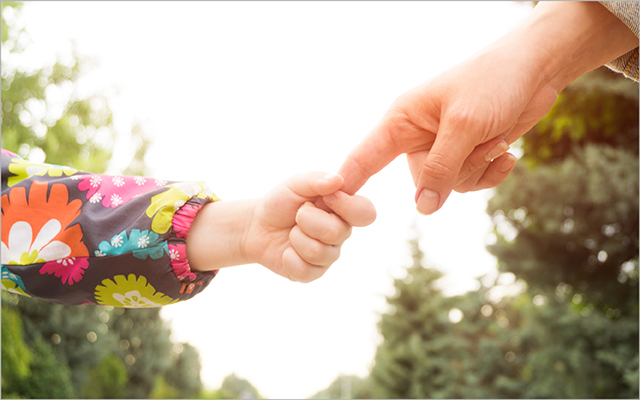If a new acquaintance were to do the same, I’d have a different reaction. Nose-to-nose inside my personal bubble, my toddler stares into my eyes, blinks her long lashes, pets my cheeks, then sighs, “I lub you, Mama.” Before I can comment, she follows it with, “Awwww,” then cuddles into my chest.
It makes my heart melt every time.
She shares her love with others, too: grandparents, aunts, and uncles; our cat; her baby doll; and her classmates. She shows joy when she sees her daycare-center teacher, and coos and giggles at pictures of people she knows. At only 2 years old, she seems to have quickly learned and embraced love, kindness, and acceptance (perhaps even more than I do now at 35).
Where did this emotion come from? Did she learn it from us, or did her little brain naturally have this ability?
Nurture certainly played a role: We had been wanting a baby for years, so when she was finally here, we both wanted to be with her as much as possible. It took me nine months to feel comfortable enough to travel without her. I’d rush home from work to see her, and we adapted our social schedules to revolve around the baby. In retrospect, I see we could’ve taken more time for ourselves and asked for more assistance, but she was our first and we were new to this whole parenting gig.
Responding to her quickly and meeting her needs seemed to have a lasting effect. Now, at 2, she seems confident, happy, and interested in the world around her. Science helps support this method of early nurturing, too, with its research into Romanian orphanages.
For 13 years, University of Maryland researcher Nathan Fox and his colleagues followed children who lived as babies in orphanages near Bucharest, Romania. The living conditions were quite poor, with understaffed institutions and babies kept on regimented schedules. Abuse was widespread. I have yet to read any documentation of the workers practicing babywearing or singing lullabies.
Later, when Fox and his team conducted magnetic resonance imaging (MRI), to inspect brain structure, and electroencephalography (EEG), to reveal electrical brain activity, they found those children who spent their early years in orphanages had noticeable changes in their brains. The gray matter of these kids’ brains had shrunk, and in contrast with the kids in the same group who had moved on to foster care, the institutionalized children also had lower-quality brain activity.
Fox’s team noted in their report that the children’s behavior appeared to be influenced by warmth and security provided by their caregiver. Other research has shown that a nurturing mother, particularly important in the early years, can yield more emotionally developed children, since they develop a larger hippocampus in their brains, the region responsible for learning, memory, and stress response. This mother–baby relationship can even have an impact on the child’s future adult connections someday.
I can’t take all the credit, of course. My caregiver instinct felt natural, but there were definitely times when I just begged her to sleep so I could respond to some work emails or tune into a movie without interruption. Overall, I’m glad I followed my gut in those uncertain early days of parenting, even when some cautioned I’d “spoil” her (how is it possible to spoil an infant?).
In the approach that felt right to me, I also learned that it has a name: attachment parenting. Hearing it made me worry I’d someday have a 16-year-old who couldn’t leave my side, but in reading guides such as The Attachment Parenting Book, by Williams Sears, MD, and Martha Sears, RN, those concerns were quickly quelled. The Searses assure their patients and readers that this type of nurturing helps babies learn to trust their caregivers, and in effect boosts their confidence to venture out, knowing that help is there when they need it.
What I really took away, however, was that following our instincts as parents and sharing the love that we naturally develop as we get to know our little ones pays off in dividends. They see us show love, they feel love from us, and they return love our way.
And then it spreads outside the family, and the rest of the world sees that love. It’s a sweetness only taught by a young one who “lubs” us.
Want to learn more about how adult love develops? Check out “Your Brain in Love.”

This Post Has 0 Comments